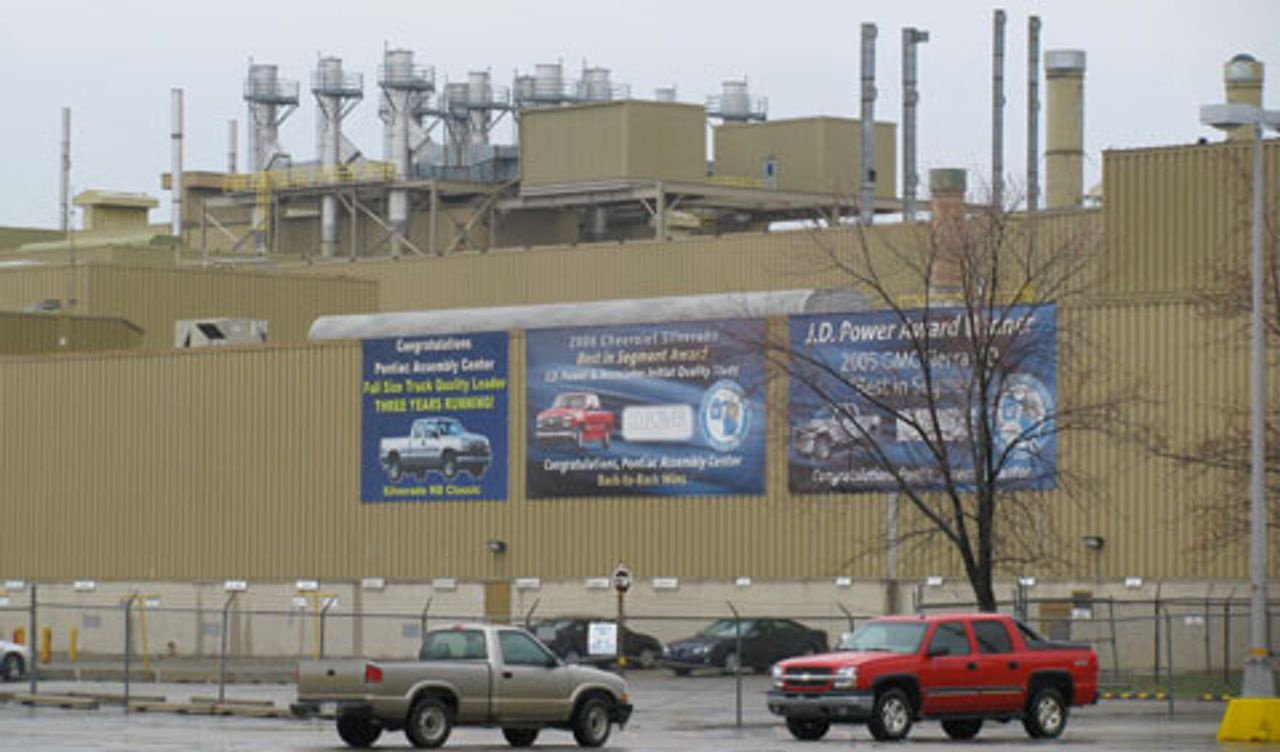Plant closings resulting from Monday’s forced bankruptcy of General Motors will cause spiraling unemployment and deep cuts in social services in many cities and states across the country. The Obama administration, whose Auto Task Force dictated the terms of the bankruptcy, has offered no serious aid to the affected workers and their communities.
GM is carrying out at least 21,000 job cuts and the closure of 14 plants and warehouses in eight states. In addition, the company has announced its intention to dump franchise agreements with 2,300 dealerships by the end of next year. Many of these will be forced to close, eliminating as many as 100,000 jobs in all 50 states.
The gutting of GM, once the most powerful corporation in the world and a symbol of US industrial might, will send shock waves through the economy, cascading into more layoffs at parts suppliers and financial ruin for thousands of small businesses.
The bankruptcy will immediately result in state and local cuts in social services, health care and education, with city and state workers targeted for layoffs, wages cuts and other concessions. It will accelerate the foreclosure crisis and further drive down home prices, as tens of thousands of workers are no longer able to meet their mortgage payments.
The Obama administration is using the concessions and layoffs, agreed to by the United Auto Workers, to attack the wages and benefits of the entire working class. Corporations will take the concessions imposed on auto workers as a signal for similar measures against their own workers.
 Pontiac Truck & Bus plant
Pontiac Truck & Bus plantThe state of Michigan, which already has the highest unemployment rate in the nation at 12.9 percent, will bear the brunt of the closures, with 42 percent of all national GM layoffs taking place there. Nearly 9,000 jobs will be lost in Michigan from Monday’s announced plant closures. The shutdowns are concentrated in southeast Michigan. They will be carried out in Flint, Livonia, Orion Township, Pontiac and Ypsilanti Township. On Friday, 700 workers were laid off when GM shuttered a stamping plant in Grand Rapids, in southwest Michigan.
It is estimated that since 2000, Michigan has lost 17 percent of its jobs—about three quarters of a million in all—as a direct result of the crisis in the auto industry. Now the state anticipates 520,000 job losses this year and next.
The consequences for the state’s limited social welfare system will be disastrous. According to one estimate, Michigan could lose an additional $18.3 billion in income. It already faces a $3 billion two-year budget shortfall, and officials recently revised downward their revenue estimate for the 2010 fiscal year by $1.7 billion, calling for an across-the-board spending cut of 8 percent.
“It’s clearly going to impact the safety net,” Governor Jennifer Granholm warned. “People, who are hurting, need services more, and we have fewer dollars.” Michigan has already carried out $300 million in budget cuts for the current fiscal year.
Oakland County in suburban Detroit will lose three factories and 6,600 jobs, the most of any county. Oakland County was already in difficult financial straits due to declining property tax revenue, a result of layoffs and the foreclosure crisis. The loss of GM-related tax revenue will result in layoffs for county workers and sharp cuts in social programs, said Bob Daddow, Oakland County’s deputy executive. “I will be going to war,” Daddow told the Detroit News. “We will need to make cuts in all departments. We have been doing these cuts all along...but the worst is yet to come on governmental revenues.”
The closure of the GM Truck and Bus plant will deepen the social crisis in impoverished Pontiac, Michigan. About 1,100 workers will lose their jobs, and the city will lose 20 percent of its current tax base, or $10 million, said Fred Leeb, the city’s emergency financial manager. Leeb made clear that Pontiac’s working class would pay the price for the shutdown. “We fear that we are going to have to cut even more deeply,” he told the Detroit News. “And there will be concessions to ask from the (city) unions.”
Flint, Michigan has lost about 50,000 GM jobs in 30 years. One thousand more were added to the grim tally when GM said Monday it would close its Powertrain Flint North plant. Monday night, the Flint City Council met to enact a series of measures to bridge a $13 million budget deficit, including the layoff of about 90 firefighters and police and the shuttering of a fire station.
The city of Livonia, an inner-ring suburb of Detroit, will lose its GM engine plant, and with it $474,000 in annual tax revenue, about 1 percent of its total. City workers have already been asked to accept pay cuts. The Detroit-Livonia-Warren area had an unemployment rate of 14 percent as of May.
Ypsilanti’s Willow Run transmission plant laid off 600 workers on Monday, and 500 more jobs will be shed by December 2010. The township will lose 4.4 percent of its tax revenue, and Washtenaw County will see a loss of $3.8 million in tax receipts. The Ypsilanti Public Schools confront a $1.4 million deficit, which will be met primarily through teacher layoffs. The city faces a budget deficit of almost a half million dollars.
In Livingston County, Michigan, the GM bankruptcy may lead to a number of parts suppliers shutting down. Already hundreds of auto parts workers have lost their jobs in recent months, according to the county’s Economic Development Council director, Fred Dillingham. Metaldyne, which employs 100 workers in the county, last week filed for bankruptcy protection. “We have a number of companies with as much as 90 percent of their business from GM. We have an awful lot of trickle-down effect from GM,” Dillingham told Livingston Community News.
The closure of GM Mansfield in Ontario, Ohio is likely to result in the elimination of city jobs and pay cuts for municipal employees. With revenues already down a quarter million dollars, the city is bracing for disaster.
Spring Hill, Tennessee, which has seen its Saturn plant idled, most likely to be closed permanently, was a single-industry town. When GM opened the plant in 1990, fewer than 1,500 people lived there. Now it has 24,000 inhabitants.
The collapse of the Big Three has brought with it a sharp decline in funding for the arts and culture. The General Motors Foundation, which contributed $31.4 million to the arts in 2007, has told many art and cultural organizations, “mostly in Detroit,” not to count on any contributions this year, the Financial Times reported last week. Toledo, Ohio, recently announced that its three-day jazz festival, the Art Tatum Jazz Heritage Festival, would be cancelled this year after Chrysler said it would no longer provide $100,000 in annual funding.
In the face of this mounting social crisis, President Barack Obama has offered little more than rhetorical palliatives, telling workers that their “sacrifices” will ensure the future for coming generations. But for the auto workers’ children, the future foretells poverty amidst a crumbling social safety net.
On Tuesday, Obama sent Edward Montgomery, his director of recovery for auto communities and workers, along with Labor Secretary Hilda Solis, to tour a Romulus, Michigan GM plant that thus far has not been slated for closure. This was followed by Solis’ appearance at a “worker round table” at Eastern Michigan University in Ypsilanti, the ostensible purpose of which was to discuss the retraining of workers for new jobs in the “green economy.”
The meeting was little more than a media stunt organized by the Democratic Party and UAW executives to present the Obama administration as a defender of jobs and divert working class anger along nationalist lines.
In her remarks, Solis outlined a series of “job training” programs that will supposedly equip workers for new high-tech and environmentally-friendly industries. But as Solis and Obama well know, these token programs cannot possibly provide decent employment for the vast majority of the workers who are losing their jobs as a result of the administration’s auto industry policy.
In what is shaping up as the worst job market since the Great Depression, even college graduates—many with degrees in engineering, computer science, robotics and management—face the highest rate of unemployment for those with a four-year degree in decades.
Among the Obama administration initiatives Solis outlined was $49 million in assistance to Michigan workers who have lost jobs due to “international trade,” federal assistance for the weatherization of homes, and summer youth programs. These are already existing programs. She could not announce any new programs to deal with the social crisis created by the bankruptcy of GM because the Obama administration has no plans for such programs.
After Solis spoke, the panel discussion was turned over to a number of local Democratic Party politicians and union officials. Don Skidmore, the Willow Run UAW local president, set the “America first” tone, declaring, “We’ve got to stop the bleeding of American jobs south of the border!” Another speaker demanded to know why Toledo, Ohio was able to keep its GM engine plant open.
The union officials are seeking to divide workers along national and even regional lines, in order to deflect attention from their real enemies—the Obama administration and the Wall Street financiers who are behind the carve-up of GM.
 GM worker in Ypsilanti, Michigan
GM worker in Ypsilanti, MichiganThe World Socialist Web Site spoke with a small number of workers, most of whom were recently retired, who came to the meeting to demonstrate against the closure of the Willow Run plant. Corky, a GM worker with 12 years, said, “We thought we were going to stay open until 2010. On Friday when we walked out of work we thought we would be coming back in mid-July. I got a call from a fellow worker that night saying we were no longer going to work there.
“It’s unfair. We’ve made enough sacrifices. I’m tired of it. This was my seventh GM plant. For two-and-a-half years I was driving down to Toledo, Ohio to work, even when gas was $4 a gallon. I’ve made sacrifices. My dad is a retired GM worker and his benefits are being cut. I put my blood and sweat into every transmission that comes off the line.
“Yesterday when they announced the bankruptcy and plant closing I was all tears and emotions. Now I’m angry.”
